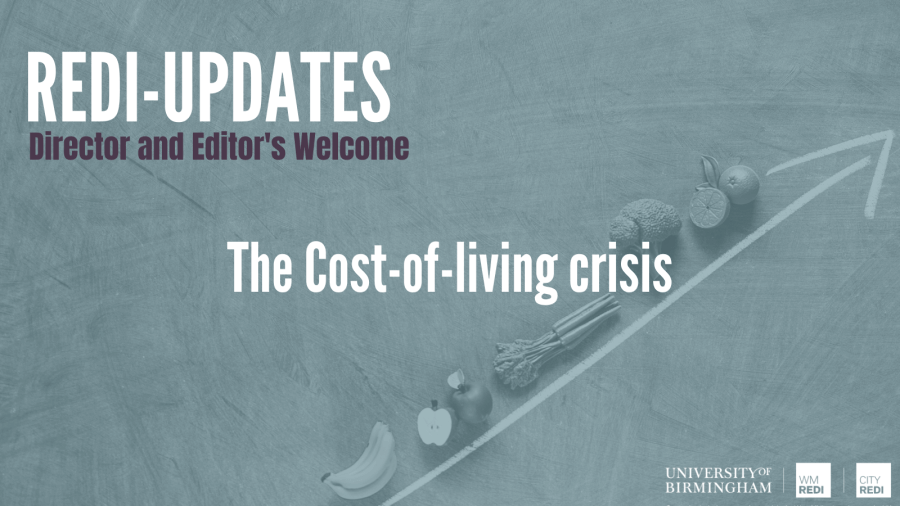The latest edition of REDI-Updates is out now - providing expert data insights and clear policy guidance. In this edition, the WMREDI team investigates what factors are contributing to the cost-of-living crisis and the impact it is having on households, businesses, public services and the third sector. We also look at how the crisis in the UK compares internationally. In this blog, Professor Simon Collinson and Alice Pugh outline what's in the latest edition of REDI-Updates. View REDI-Updates.
Professor Simon Collinson – Director’s Welcome
Every fortnight I present our Economic Impact Monitor (and recently the 100th edition) to a large group of regional and national stakeholders, Chaired by Mayor Andy Street. We track economic and social trends and analyse the impact on the West Midlands region and implications for businesses and communities. In recent months this report has been dominated by the effects of rising costs and inflation on this region, nationally and globally. This is the challenge we focus on for this edition of REDI Updates.
We also demonstrate, through the briefings in this Update, how our policy-led research and analysis focuses on regional communities and social impacts, as well as economic and business trends. Firms and households more than interact in a regional economic system, they co-exist. The fate of one affects the fate of the other. Not least because householders are employees and household income from employment underpins consumption (and the resulting economic multipliers) and correlates with health and wellbeing (and the resulting costs of benefits and government support services). Firms in turn benefit from the skills, capabilities and wellbeing of employees, or struggle, when these are limited or in decline.
The rising costs of energy, inputs from supply chains, and labour wages are all placing pressure on our businesses. The rising cost of living presents a significant challenge to our households and in particular low-income communities.
The City-REDI team has put together an excellent set of briefings covering the cost-of-living crisis and tracing multiple sources of inflation with different impacts and future trend lines. These provide data and evidence, from the local to the global, through international comparisons of cost of living. We cover the impacts on business, varying by sector and size, and note that March 2023 saw the highest number of company insolvencies in the country since the ONS started collating the data. This has significant impacts on households, shown by interregional comparisons at the national level and intra-regional differences for the West Midlands. We also look at the impact on people’s health and well-being, on public sector services and the third sector, and on inequality and the worsening conditions for levelling up. Finally, we ask what is the government doing and where should policy interventions be targeted?
My thanks to the City-REDI team for their efforts. I hope this edition of REDI Updates is of relevance and interest to all of our partners and stakeholders locally and nationally.
Alice Pugh – Editor of REDI Updates
The REDI-Update is an annual publication which gets behind the data and translates it into understandable terms. WMREDI staff and guest contributors discuss various topics within this fourth edition, focusing on the development and impact cost-of-living crisis on businesses and households, and the effectiveness of the government’s response.
In the last edition of the REDI-Updates, WMREDI demonstrated our research into the challenge of implementing, understanding and measuring levelling up. Through our analysis, we supported regional and national partners to better understand the challenges they will face with regard to levelling up.
In this fourth edition of REDI-Updates, we are looking into a topic that is extremely challenging for all places and individuals within the UK. The cost-of-living crisis has been rapidly growing over the last two years, fed by several factors both international, national and local.
In this report, we investigate what factors are contributing to the cost-of-living crisis? How has the crisis impacted businesses and their operations? How has the crisis impacted households and their consumption habits? What has been the impact on inequality? What has been the impact on public and third-sector services? How does the cost-of-living crisis compare internationally?
Our analysis, provided in this edition of REDI-Updates, demonstrates that we are effective in responding to moving agendas, but crucially that we have a breadth of research expertise readily available to add depth to any analysis.
The research demonstrates the impact that the cost-of-living crisis is having on businesses and households and how the two interact, with the fate of both intertwined, leading to a spiralling cycle of economic decline. This particularly impacts the most vulnerable – both households at the lower end of the income scale and small businesses.
At its core, our research and analysis discussed in this edition demonstrate WMREDI’s innovative hybrid mix of academic expertise at meeting emerging real-time challenges as they develop.
This blog was written by Professor Simon Collinson, Director, and Alice Pugh, Policy and Data Analyst, City-REDI / WMREDI, University of Birmingham.
Disclaimer:
The views expressed in this analysis post are those of the authors and not necessarily those of City-REDI / WMREDI or the University of Birmingham.



